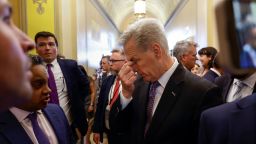The US Chamber of Commerce is strongly pushing back against efforts from Sens. Bernie Sanders, Elizabeth Warren and other progressives to urge the White House to use the 14th Amendment to avoid a disastrous default.
The Chamber, a pro-business trade group that often supports Republicans, sent President Joe Biden a letter on Friday warning of economic, financial and legal turmoil should the administration attempt to take this controversial route to address the debt ceiling.
“It is the Chamber’s view that attempting to invoke so-called ‘powers’ under the 14th Amendment would be as economically calamitous as a default by a failure to lift the debt limit in a timely manner,” Neil Bradley, the Chamber’s chief policy officer and a former senior aide to House Speaker Kevin McCarthy, wrote in the letter.
Bradley argued that invoking the 14th Amendment would send Treasury rates spiking, lifting the cost of borrowing for families and businesses.
“The legal uncertainty around this debt combined with increased interest costs would impose significant and long-term costs on the economy similar to default,” Bradley wrote. “Simply put, there is no alternative to reaching a bipartisan agreement to raise the statutory debt limit.”
The Chamber cited a Thursday letter sent by Sanders, Warren and nine other Senate Democrats urging Biden to prepare to invoke the 14th Amendment.
“We write to urgently request that you prepare to exercise your authority under the 14th Amendment of the Constitution, which clearly states: ‘the validity of the public debt of the United States…shall not be questioned,’” the Democrats wrote.
Experts have warned that invoking the 14th Amendment would likely spark a constitutional crisis and Treasury Secretary Janet Yellen recently cast doubt on the idea.
US markets turned negative on Friday on news that debt ceiling negotiations between the White House and House Republicans have hit a snag.
Mark Zandi, chief economist at Moody’s Analytics, told CNN on Friday he isn’t surprised about the impasse.
“I always thought this would go right down to the wire,” Zandi said in a phone interview. “If the rhetoric is dark next week, markets will start to react. We’ll see a lot more red on the screen and by the end of the week, it’ll be dark red.”
Zandi warned that if there is still no deal after Memorial Day weekend, markets could face a 2011-style moment where major indexes lose 3% to 5% in a single day.
“That would light a fire under lawmakers,” he said.









